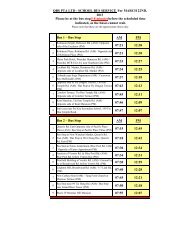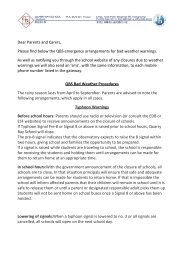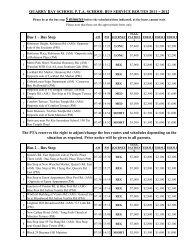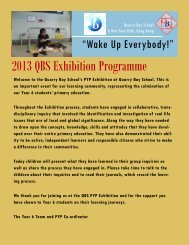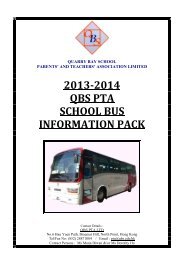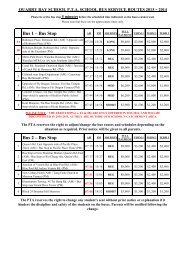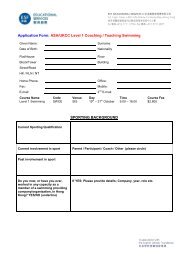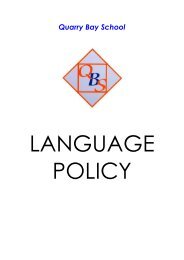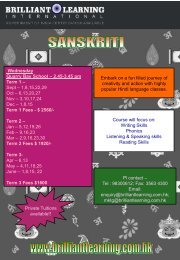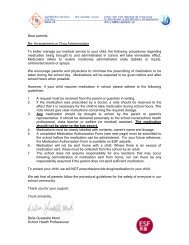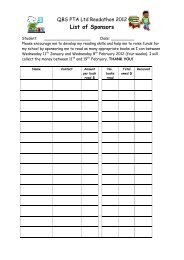Parent Brochure [pdf] - Quarry Bay School
Parent Brochure [pdf] - Quarry Bay School
Parent Brochure [pdf] - Quarry Bay School
Create successful ePaper yourself
Turn your PDF publications into a flip-book with our unique Google optimized e-Paper software.
<strong>Quarry</strong> <strong>Bay</strong> <strong>School</strong><br />
So what do the children do?<br />
Obviously lessons are differentiated.<br />
Each year group work on a variety of<br />
skills. A typical week might see Year 1<br />
students organising information on<br />
simple sorting diagrams, Year 3 using<br />
our online catalogue to locate materials<br />
in the Learning Centre whilst Year 5<br />
use BubblUs to help define areas of<br />
interest and their initial ideas. Plans<br />
are shared with the class teachers ensuring<br />
that work in the Learning Centre<br />
supports class work. We are well<br />
equipped in terms of technology, enabling<br />
us to use computers when they<br />
will enhance learning and teaching.<br />
How can parents support?<br />
These days, there are many, many sources<br />
of information. Children are bombarded by<br />
messages from several media and online<br />
sources, books, friends, and people at<br />
school. An important step in developing<br />
information literacy is learning to evaluate<br />
the source of information, especially for<br />
online information. It's helpful to help your<br />
child consider some of the following:<br />
<br />
<br />
<br />
Who is the author of the information?<br />
What do we know about the author or<br />
organization? Is that person an expert?<br />
Is that organization respected by others?<br />
Why was this information written? Is<br />
the author trying to persuade you to<br />
buy something?<br />
O r g a n iz a t io n<br />
Does the information present fact or<br />
opinion?<br />
Is the information recent? When was it<br />
published?<br />
<strong>Parent</strong>s and teachers can help children<br />
develop research and information literacy<br />
by sharing their love of learning. Encourage<br />
their curiosity about the world and desire to<br />
find out more. At the same time, help them<br />
become wise consumers of the information<br />
they find. These are skills that will last a<br />
lifetime.<br />
Information in this leaflet based on work from<br />
http://librarywales.org and http://www.colorincolorado.org<br />
Information<br />
Literacy: Benefits<br />
for schools<br />
“Information literacy is knowing<br />
when and why you need<br />
information, where to find it and<br />
how to evaluate, use and<br />
communicate it in an ethical<br />
manner.”<br />
CLIP, Information Literacy.<br />
Definition (2004)<br />
QBS; Empowering learners to make a<br />
difference.
Supporting independent learning<br />
Information of varying quality is<br />
more abundant than in previous<br />
generations. Children are faced<br />
with many information challenges<br />
as they grow up and mature. The<br />
education we provide must provide<br />
them with the skills to be able to<br />
navigate the constantly developing information<br />
landscape.<br />
Information literacy fosters skills required for<br />
researching, evaluating and putting information<br />
into context which is essential for independent life<br />
long learners.<br />
It has been demonstrated that when librarians<br />
and teachers work together, students achieve<br />
higher levels of literacy, reading learning,<br />
problem solving and information and<br />
communication technology skills.<br />
(IFLA/UNESCO, <strong>School</strong> Library Manifesto, 2006)<br />
Literacy Skills<br />
Information literacy reinforces both reading and writing<br />
skills.<br />
<br />
<br />
Reading skills are practiced in a task orientated<br />
way when seeking information<br />
Writing skills are reinforced when recording<br />
and presenting.<br />
As students develop the skills to use the library, information<br />
resources and locate information, they are<br />
encouraged to practice reading in context.<br />
Curriculum<br />
At QBS we base our information curriculum on<br />
several highly regarded documents.; The Information<br />
Fluency Continuum written by New York District<br />
Libraries and the National Information Literacy<br />
Framework, Scotland. These documents have been<br />
combined and provide us with a clear framework and<br />
a set of bench marks against which to measure<br />
progress.<br />
These documents can be found at; http://<br />
schools.nyc.gov/NR/rdonlyres/27A1E84E-65EB-<br />
4A54-80DF-51E28D34BF4F/0/<br />
InformationFluencyContinuum.<strong>pdf</strong> and http://<br />
caledonianblogs.net/nilfs/framework-levels/<br />
schools/<br />
Our children are encouraged to use the<br />
Information Process Cycle to structure their<br />
research. This, and tools to support its use, can<br />
be found on our Qoodle site<br />
For further information on each year levels<br />
information literacy benchmarks please contact<br />
the Learning Centre and we will be more than<br />
happy to share them with you. .<br />
<strong>Quarry</strong> <strong>Bay</strong> <strong>School</strong>


![Parent Brochure [pdf] - Quarry Bay School](https://img.yumpu.com/28486273/1/500x640/parent-brochure-pdf-quarry-bay-school.jpg)
